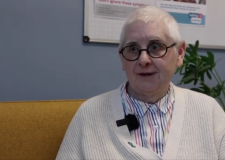Brighton medical researchers ask: Is your asthmatic child taking the right medicine?
Children with asthma may be using medicines that do not work and in some cases this could increase their suffering, according to Brighton medical experts.
Research at the Brighton and Sussex Medical School (BSMS) has shown that a popular inhaler used as first-line treatment for asthma attacks may not be effective. It may even make the condition worse for some children carrying a particular gene change.
The researchers’ concerns follow the publication last week of the first national study of asthma deaths in Britain.
It found that some asthma patients are dying because of complacency among medical staff and patients.
BSMS experts are planning new trials this autumn which they believe will provide further evidence to support the idea of providing personalised medicine to improve treatment.
Somnath Mukhopadhyay, the chair of paediatrics at BSMS, is heading the research. He said: “Both asthma ‘reliever’ and ‘controller’ medicines may not work well in a proportion of children because the child’s genetic make-up makes the medicine less effective.
“A simple test can determine whether a child carries the gene change and identify those who might benefit from a switch to an alternative, more effective medicine.”
Professor Mukhopadhyay said that parents and health professionals should be made more aware of the possible risks to children who carry the gene change.
His concerns have been supported by data released this week and funded by the charity Haydn’s Wish, named after nine-year-old asthma sufferer Haydn Wileman, from Newhaven, who died in 2011 after an allergy reaction.
The charity, which supports the BSMS research, said that the audit showed that many parents of children with asthma felt the blue inhaler did not work well.
Haydn’s mother Emma Wileman, who leads the charity, said: “Some children with asthma appear to be suffering more because they are not responding to ‘reliever’ medicine.
“We believe parents need to be made more aware of this and there should be more research as a matter of urgency.”
BSMS, a partnership between the universities of Brighton and Sussex, will lead the new trials at several UK centres. GPs, hospital doctors and asthma nurses will work with parents to find out whether personalised treatment can improve the lives of children with asthma.
Professor Mukhopadhyay said: “Treatment that is personalised for each child on the basis of his or her genetic status could make asthma medicines more effective in controlling symptoms and reducing the risk of asthma attacks.”
The work will involve two groups of parents, doctors and nurses, with one group being given information on the child’s genetic features.
Earlier research showed that traditional asthma medicines like salmeterol and salbutamol, when added on to inhaled steroids, may not improve symptoms for one in seven children with asthma who carry the particular gene change. The children respond better to an alternative anti-inflammatory asthma medicine.
The latest study will use parent choice to help compare the benefits of the current “step-up” treatment, where children receive additional treatments if their asthma fails to improve, against a novel way of treating asthma where parents and health professionals consider selecting asthma medicines by matching the child’s gene information with their response to existing treatments.
Recommendations for the child as suggested by their genotype result will be made available in easily understood language to the child, the parents, their GPs and nurses.
The study will seek to identify whether there is an improvement in quality of life due to personalised treatment.
Studies have suggested that other medicines may be more effective than the current step-up treatment in a large minority (45 per cent) of children.
In the first trial of its kind in asthma and other common chronic diseases in children, the gene test will use the principles of personalised medicine to identify children who could be unresponsive to the current step-up medicine at the start of therapy with the new medicine, directing them towards an alternative step-up medicine.
In the second group, parents and health professionals will not be given the children’s genotype information and the children will be managed according to the conventional step-up method for managing uncontrolled asthma.
Both groups of children will be followed up on and checked after one year.
The new £200,000 trial is being funded by children’s charity Action Medical Research, and physicians and geneticists from London, Dundee and Aberdeen will be participating.
A complementary study, led by Professor Mukhopadhyay in collaboration with Haydn’s Wish is being funded by a Department of Health Research for Patient Benefit grant worth £257,000. It will explore underlying differences in airway responses to salbutamol between wheezy children with normal genotype versus those affected by these genetic changes.
This will help doctors understand the differences in airway response that may underlie the changes.
Professor Mukhopadhyay said: “It could help us understand whether some children with recurrent wheeze are responding poorly to first-line ‘reliever’ asthma medicine prescribed for home use.
“This is already indicated by our survey of parents’ views. If so, a more individualised follow-up of these children ensuring parents have medicine at home that is effective in managing asthma attacks early could be an important step in preventing such attacks getting worse.
“The researchers will work with doctors in France who are conducting a similar study. This will help the interpretation of results and could make findings easier to generalise over a wider population of children in Europe.”
The Department of Health study is based mainly in Brighton and will be conducted in collaboration with NHS colleagues.
A parent representative will help ensure the research remains well-grounded and focused on benefit for children and families. Both studies are supported by NHS Research and Development in England and Scotland.



















